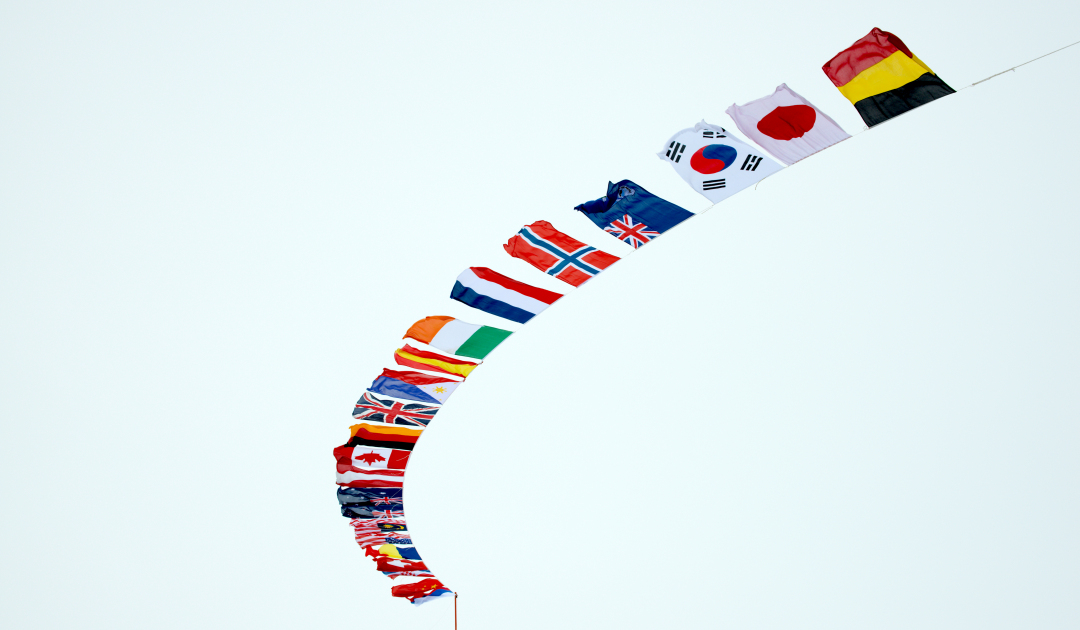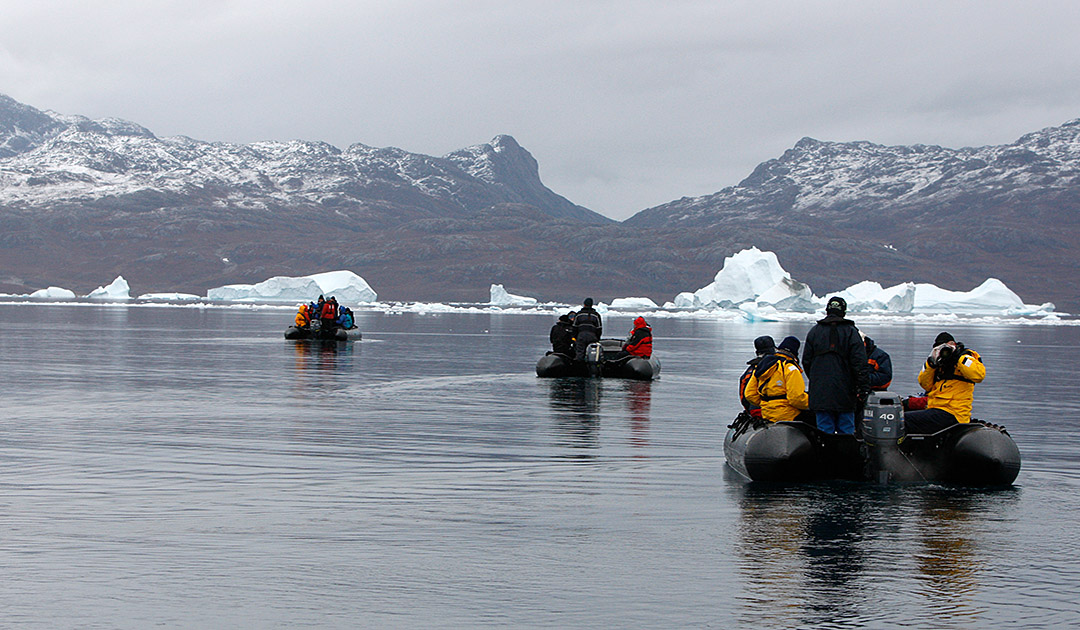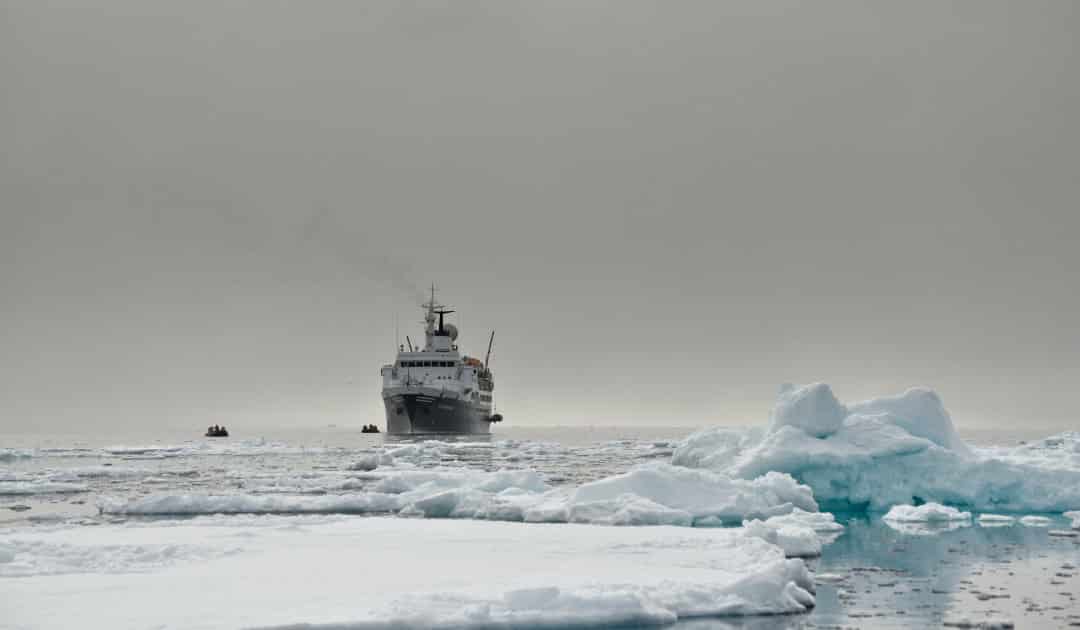
Out of the frying pan and into the fire probably best sums up the current state of this year’s Arctic tourism season. No sooner had the Arctic states relaxed or completely lifted their Covid measures than Russia invaded Ukraine and caused the next uproar. The result: severe economic sanctions, rising fuel prices and closed borders. As a result, Arctic tour operators have had to reorganize their plans.
Franz Josef Land, Novaya Zemliya or the North Pole? Exotic destinations on the list of Arctic tourists that should have finally been headed for this year after Covid and protection measures had tied the hands of the tourism industry for the past two years. The hopes of many tour operators and shipping companies to be able to offer trips to these still little-visited regions this year have been dashed by Russia’s invasion. This means that the development of new routes and services east of Svalbard will fall through and alternatives will have to be offered quickly. This is no easy undertaking, as the number of ships and operators looking to secure a piece of the Arctic travel pie has not diminished despite a two-year pandemic-related hiatus. But at least for the North Pole trip there is an alternative this season. The French icebreaker “Le Commandant Charcot” is to head for the northernmost point in the world from Svalbard according to the plans of owner company Ponant.

Instead of booking guests into the last seats, tour operators and ship operators have been frantically adding new destinations, new routes and rebooking for about three weeks. Thomas Lennartz, the VP of Sales at Quark Expeditions, confirms this: “Because of Russia’s actions in Ukraine, some swift changes had to be made and there’s a lot going on right now.” The Canadian company, which has been in business for more than 30 years, has offered North Pole voyages aboard the Russian nuclear icebreaker for many years and had big plans to go deeper into the Russian Arctic this year. “Specifically for Russian voyages, we immediately canceled our two North Pole voyages on the 50 Years of Victory and two Russian sailings on the Ocean Adventurer last week,” he explained in an email to PolarJournal. This means informing hundreds of travelers and offering alternatives. Dutch shipping company Oceanwide Expeditions, which had planned to sail into the Arctic season with a total of five ships, also has to bury its plans in the Russian Arctic and has made major changes to its tour schedule, it wrote in an email.

The problem in selecting alternatives does not lie so much with the regions as such. Svalbard, Greenland, Nunavut and Alaska offer fascinating and exciting insights into the Arctic. Lennartz agrees: “With more and more countries lifting travel restrictions, the return to port protocols becoming clearer, combined with local communities in the Arctic indicating that they are looking forward to seeing cruising return — the Arctic is looking very promising as a reliable destination to book and travel to this summer.” And most suppliers and operators also have a diverse portfolio already organized, so most guests should be able to enjoy their trips despite the cancellations. “We operate 100 percent in the remaining Arctic regions of Svalbard, Greenland, Iceland and Canada,” Quark Expeditions affirms.

The problem now operators and shipping companies are facing is deciding whether to move the ships scheduled for the Russian Arctic to other locations or to cancel them altogether and hope for next year. Especially the latter is a very risky and delicate procedure due to the cause. Heading to new locations would be an option, but with the volume of providers and vessels, this route is likely to be a logistical challenge for both planning at landing sites along the coasts and for the communities visited in the course of such landings. Another factor is the guests themselves, who had decided to travel to the Russian Arctic. Experience shows that the more exotic the Arctic destination, the more experienced the passengers on board. This means that regions such as Svalbard, Iceland or Greenland are likely to be only a conditionally attractive destination for these guests. While new additional activities or specifically new and unknown places could change this. But for this to happen, the relevant permits must be in place, which is usually an administrative and time-consuming procedure. And time is scarce, as most trips will begin in about two months. Some of the shipping companies have not yet announced a decision on how they will operate the upcoming season.

Another problem that arises with the changes in schedules is the issue of fuel. For this is usually built into the seasonal planning, consumption is calculated relatively accurately and included in the selling price. This is based on the assumption that there will be some fluctuations in fuel prices. But since Russia’s attack and the sanctions, prices have skyrocketed. For tour operators, this means deciding whether they want to or can pass on these increases to customers. That’s not an easy decision to make considering the fact that they have just come out of the pandemic and are trying to get the market going again. “At this point, we are not considering any fuel surcharges for our upcoming seasons,” explains Lennartz. Other providers will also need to communicate their decisions in the next few weeks. In any case, one thing is clear: the Arctic tourism industry is not facing an easy time this year… again.
Dr Michael Wenger, PolarJournal





